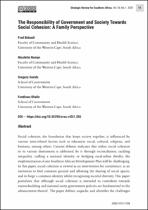| dc.contributor.author | Bidandi, Fred | |
| dc.contributor.author | Roman, Nicolette | |
| dc.contributor.author | Davids, Gregory | |
| dc.date.accessioned | 2022-05-19T11:51:19Z | |
| dc.date.available | 2022-05-19T11:51:19Z | |
| dc.date.issued | 2021 | |
| dc.identifier.citation | Bidandi, F. et al. (2021). The responsibility of government and society towards social cohesion: A family perspective. Strategic Review for Southern Africa, 43(1),11-33. https://doi.org/10.35293/srsa.v43i1.335 | en_US |
| dc.identifier.issn | 1013-1108 | |
| dc.identifier.uri | https://doi.org/10.35293/srsa.v43i1.335 | |
| dc.identifier.uri | http://hdl.handle.net/10566/7434 | |
| dc.description.abstract | Social cohesion, the foundation that keeps society together, is influenced by various inter-related factors such as education social, cultural, religious, and business, among others. Current debates indicates that unless social cohesion in its various dimensions is addressed, be it through reconciliation, tackling inequality, crafting a national identity, or bridging rural-urban divides, the implementation of any Southern African Development Plan will be challenging. In this paper, social cohesion is viewed as an intervention for coexistence; as an invitation to find common ground and allowing the sharing of social spaces; and to forge a common identity whilst recognising societal diversity. This paper postulates that although social cohesion is intended to contribute towards nation-building and national unity, government policies are fundamental to the advancement thereof. | en_US |
| dc.language.iso | en | en_US |
| dc.publisher | University of Pretoria | en_US |
| dc.subject | Family | en_US |
| dc.subject | Public policy | en_US |
| dc.subject | Social cohesion | en_US |
| dc.subject | Southern African Development Plan | en_US |
| dc.subject | Government's responsibilities | en_US |
| dc.title | The responsibility of government and society towards social cohesion: A family perspective | en_US |
| dc.type | Article | en_US |

